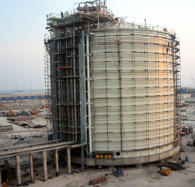Integrated industrial flooring for pharmaceutical industries and clean rooms (Epoxy Flooring)
In pharmaceutical industries where compliance with GMP (Good Manufacturing Products Comp) is a principle, the use of polymer coatings (epoxy or polyurethane) that are completely hygienic and seamless is part of the laws of the Ministry of Health of each country. Polymer floor coatings are free from any bubbles, pinholes, and cracks. The important characteristics of these coatings are their high physical, mechanical, and chemical properties (chemical resistance to acid and alkali) and high abrasion and impact resistance. The ability to wash and clean these coatings is of great importance in the pharmaceutical industry. In order to prevent the accumulation of dirt and germs on the sides of the wall (the floor and wall interface), the use of epoxy grout is essential.
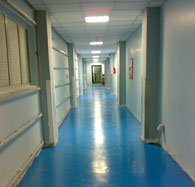
Integrated industrial flooring for food industry halls (Epoxy Flooring)
In the food industry, where compliance with the principles of FDA (Food and Drug Administration) and HACCP (Hazard Analysis & Critical Control Point) is a principle, the use of polymer coatings (epoxy or polyurethane) is part of the laws of the Ministry of Health of each country. These coatings are completely smooth, hygienic, and seamless, without any seams. Polymer floor coatings are free of any bubbles, pinholes, and cracks. Today, epoxy or polyurethane coatings reinforced with microsilica (Reinforced With Silica) are used more in the food industry than conventional epoxy or polyurethane. In addition to higher thickness, reinforced coatings have higher resistance to water, washing, chemicals (acids and alkalis), impact, and abrasion than their conventional counterparts.
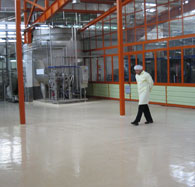
Integrated industrial flooring for industrial factory floors (Epoxy Flooring)
Due to the use of heavy forklifts and the occasional possibility of heavy parts falling on the floor, these factories require a coating that, in addition to high abrasion resistance, also has high impact resistance. Therefore, epoxy flooring is used for production halls and polyurethane flooring is used for warehouses.

Integrated industrial flooring for multi-storey parking floors (Anti-Dust Flooring)
The concrete in the floor of multi-storey parking garages is not resistant to abrasion caused by car tires. Concrete is also not resistant to penetration and contamination of substances such as oil, gasoline, and brake fluid, which causes damage to it. Therefore, it is necessary to cover the concrete with epoxy or polyurethane materials. Epoxy or polyurethane flooring suitable for multi-storey parking garage floors with a low thickness (maximum one millimeter) is applied to the floor after the subfloor is completed. It is also possible to draw lines and number these floorings to identify the movement routes and parking locations of vehicles.
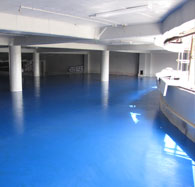
Integrated industrial flooring for electrical rooms in the oil, gas and petrochemical industries (Sub Station Flooring)
Among the uses of epoxy flooring in refineries and petrochemical plants are the floors of electrical and control rooms (Sub-Station) as well as product warehouses and floors of fire stations. It is worth noting that the slightest dust from the concrete floor on the switches of the electrical and control units of refineries and petrochemical plants will cause a sudden stop (Trip) of the unit and will result in irreparable financial losses. Also, in fire stations, the high speed of fire personnel to board and reach the fire site is the first condition. Therefore, in order to prevent people from slipping, non-slip epoxy flooring (Non-Skid) is applied on the floor of the station.
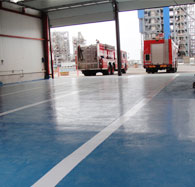
Integrated industrial flooring for chemical and military industries, antistatic and conductive
These floors are different from others in terms of their base material and have the ability to conduct static electricity from the surface to the orthotic well. The resistance range of antistatic floors is 106-108 ohms and conductive floors is 106-25000 ohms. These types of floors are used in electronics industries and explosives manufacturing industries and places where sparks can cause irreparable damage.
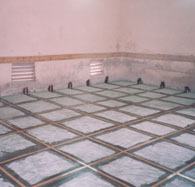
Integrated industrial flooring made of polyurea with high abrasion resistance (Polyurea)
Polyurea is a type of elastomer obtained from the reaction of isocyanate and polyamine. This product, with its high coefficient of mechanical, physical, thermal and chemical resistance, overcomes the defects of polyurethane coatings and, by using superior manufacturing technology, has led to the production of strong and flexible polymers with a high setting speed. The most common use of polyurea is on concrete and steel for corrosion protection and abrasion resistance.
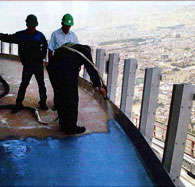
Sand Blasting and Painting of Tanks, Pipes and Equipment Oil, Gas and Petrochemical Projects (Sand Blast & Painting)
Sandblasting is performed to remove rust and Milscale from the inside and outside of tanks, pipes, and equipment used in the oil, gas, and petrochemical industries, along with creating a rough surface for better adhesion of the lining. Rust removal is done with silica, sandpaper, garnet, slag, and painting is done with an airless machine.
